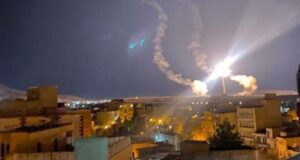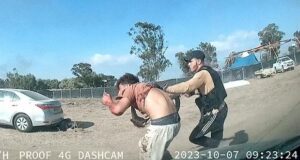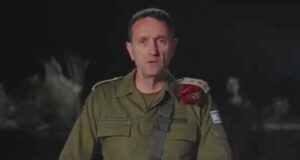Gaza’s terrorist Hamas rulers said Saturday they had accepted a cease-fire ending a massive Israeli onslaught on militant positions after an Israeli soldier was shot dead. The concession by Hamas, which has been pounding Israeli cities with a barrage of rockets for weeks, pulled the sides back from the brink of a full-fledged war.
Israel and Hamas have fought three such wars over the past decade and Hamas agreed to the second such cease-fire in a week under heavy Egyptian and international pressure.
Even after last week’s cease-fire ended the fiercest exchange of rocket fire and Israeli airstrikes since the 2014 war, incendiary kites and balloons continued to float from Gaza into Israel setting off damaging fires to farmlands. Israel has stepped up strikes since then to signal its new threshold for engagement after months of largely refraining to act.
Israel says it has no interest in engaging in another war with the terrorist organization but says it will no longer tolerate the Gaza militant campaign of flying the incendiary devices into Israel.
On Friday, a Palestinian sniper killed an Israeli soldier along the border — the first casualty it has sustained in four years — and Israel unleashed an offensive it says destroyed more than 60 Hamas targets, including three battalion headquarters. Three Hamas terrorists were killed.
“The attack delivered a severe blow to the Hamas’s training array, command and control abilities, weaponry, aerial defense and logistic capabilities along with additional military infrastructure,” the Israeli military said in a statement, adding that the strikes “will intensify as necessary.”
Israel’s top leadership convened late into the night Friday at military headquarters to discuss potential actions.
In a brief statement early Saturday, Hamas spokesman Fawzi Barhoum said the movement accepted the cease-fire brokered by Egyptian and United Nations officials and that calm had been restored. Later, the Israeli military announced a return to civilian routine along the volatile border.
The recent outburst of violence comes after months of near-weekly border protests organized by Hamas aimed in part at protesting the Israeli-Egyptian blockade of Gaza. Over 130 Palestinians, the vast majority of them militant Hamas members, have been killed by Israeli fire since the protests began on March 30. Hamas has come under scrutiny and criticism for staging fake injuries and forcing some Gaza residents to protest at the border. One Gaza woman, interviewed on CNN, lamented the death of her young baby at the border as a result of Israeli tear gas until it was revealed the child already had a terminal illness and was taken to the border to die and then be used for propaganda purposes.
Israel and Egypt have maintained a blockade on Gaza for over a decade in an attempt to weaken Hamas. The blockade has caused widespread economic hardship. Israel says the naval blockade is necessary to protect its citizens from weapons smuggling.
Israel says it is defending its sovereign border and accuses Hamas of using the protests as cover for attempts to breach the border fence and attack Israeli civilians and soldiers.
“Hamas terrorists opened fire today on Israelis. Those are not ‘protesters,’” Foreign Ministry spokesman Emmanuel Nahshon wrote Friday on Twitter. “We will not tolerate attacks endangering Israelis. Under no circumstance.”
The Israeli retaliation Friday to the soldier’s killing was fierce, but Hamas’ response was far meeker with just a few projectiles launched that were intercepted by Israel.
As behind-the-scenes Trump peace process quietly moves forward, Israel and its once former enemies like Saudi Arabia and Egypt, have become closer–even sharing military information and intelligence concerning terrorists. The Palestinian government in Gaza and West Bank have lost much of their support in the Arab world as nations become weary of conflict and he corruption which eats up the billions of dollars in aid given to the Palestinians.
The United Nations continues, however, to condemn Israel in one-sided statements and votes that, without exception, favor the terrorist led Gaza government. As a result, the United States has pulled out of several U.N. committees in protest–the first time those committees have been held accountable for supporting terrorism.
 Metro Voice News Celebrating Faith, Family & Community
Metro Voice News Celebrating Faith, Family & Community 







